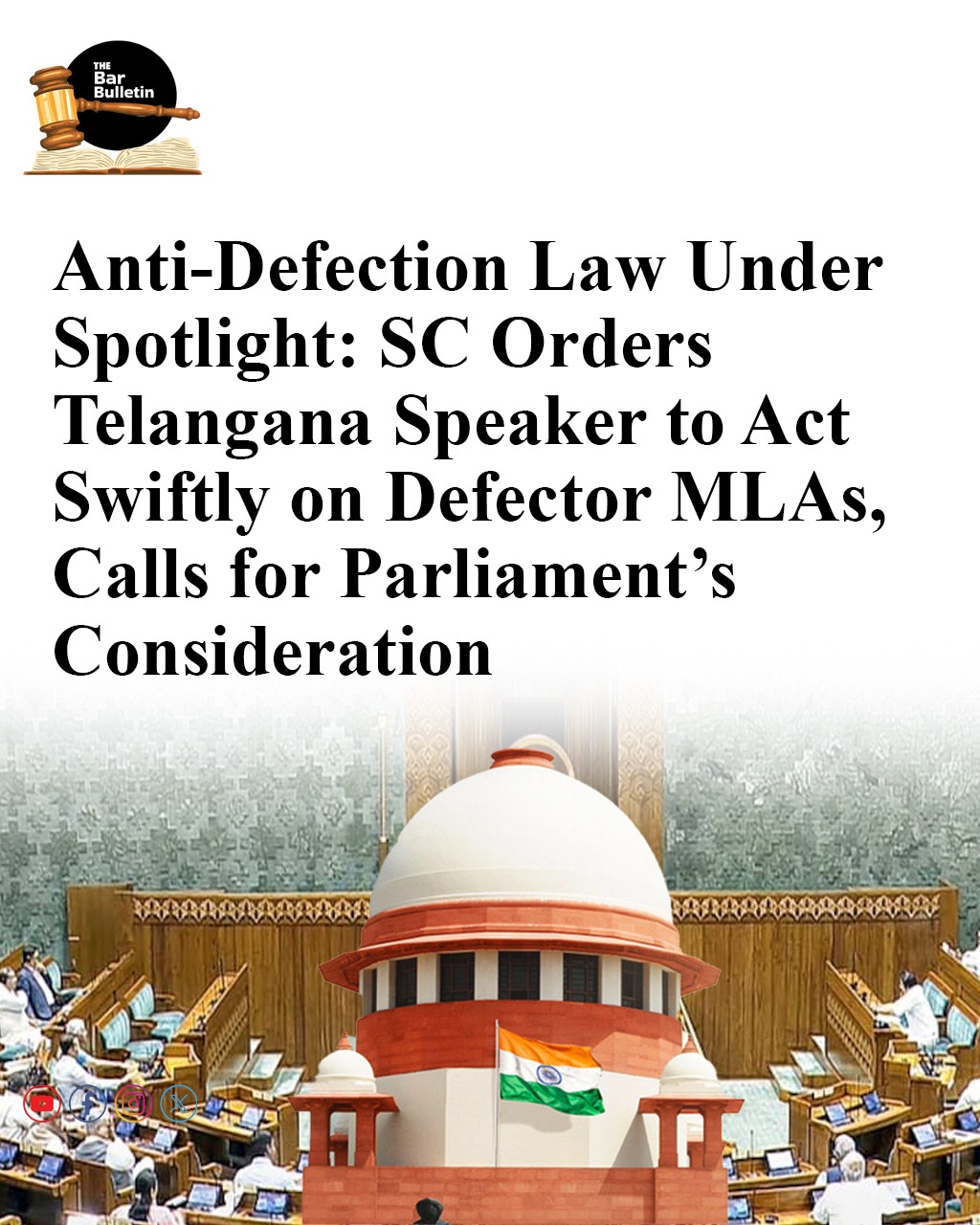The Supreme Court quashed a Telangana High Court Division Bench order and directed the Speaker of the Telangana Legislative Assembly to decide pending disqualification petitions against 10 MLAs accused of defection within three months.
The case arose from the 2023 Telangana Assembly elections, after which 10 MLAs originally elected on Bharat Rashtra Samithi (BRS) tickets defected to the Indian National Congress (INC) between March and April 2024. Under Paragraph 2(1) of the Tenth Schedule (the anti-defection law), opposition MLAs petitioned the Speaker to disqualify the defecting MLAs. However, the Speaker issued no notice for over seven months, prompting the petitioners, opposition MLAs, to approach the High Court for urgent intervention.
A Single Judge of the Telangana High Court ordered the Assembly Secretary to place the petitions before the Speaker within four weeks. The Division Bench, however, set aside this order, citing constitutional precedents that bar “quia timet” actions (pre-emptive judicial timing directions) and limit High Court intervention before the Speaker decides.
The Bench comprising Chief Justice B.R. Gavai and Justice Augustine George Masihexhaustively reviewed the legislative debates, anti-defection jurisprudence, and binding precedents, notably Kihoto Hollohan, Rajendra Singh Rana, Subhash Desai, and KeishamMeghachandra Singh. It reaffirmed that, while the Tenth Schedule vests initial adjudicatory power in the Speaker as a Tribunal, the Speak enjoys no constitutional immunity under Articles 122/212 when exercising quasi-judicial powers, making his decision subject to limited judicial review for jurisdictional errors, mala fides, or violation of natural justice.
On the facts, the Court found the Speaker’s inaction indefensible, for reasons includingnotices being issued to the concerned MLAs only after Supreme Court intervention, defeating Parliament’s explicit object for swift adjudication under the Tenth Schedule. The Court observed that not issuing any direction would amount to permitting the Speaker to repeat the widely criticized situation of “operation successful, patient died”.
The Bench also highlighted persisting concerns about partisan delays and called on theParliament to re-examine whether the Speaker should remain the forum for deciding defections, given recurring abuse and the risk to democratic foundations.
The order reinstated the Single Judge’s decision, and mandated the Speaker to conclude all pending disqualification proceedings against the 10 MLAs within three months, requiringadverse inference if any respondent-MLAs attempt to delay. The Supreme Court, however, did not make comments on the question of disqualification, respecting the constitutional scheme which vests first instance jurisdiction in the Speaker.
Appearances:
For the Appellants: Senior Advocates C. Aryama Sundaram, Dama Seshadri Naidu, Gandra Mohan Rao, AORs P. Mohith Rao, Vikas Mehta, Advocates J Akshitha, J Venkat Sai, Eugene S Philomene, Zafar Inayat Ganai, Rahul Jayapala Reddy, Shubhankar Sharma, Rohini Musa, Abhishek Gupta, Basa Mithun Shashank, Anthony Reddy Katakam, and R.V. Pavan Maitreya.
For the Respondents: Senior Advocates Mukul Rohatgi, Abhishek Manu Singhvi, Ravi Shankar Jandhyala, Gaurav Agrawal, S. Niranjan Reddy, AAG T. Rajnikant Reddy, AORs Sravan Kumar Karanam, Hitendra Nath Rath, Neha Rai, Mahfooz Ahsan Nazki, Sumanth Nookala, Devina Sehgal, Aruna Gupta, Ankit Agarwal, Mukesh Kumar, D. Abhinav Rao, Advocates Priyansha Sharma, Lavkesh Bhambhani, Aniket Singh, Kumar Abhishek, Laxmi, Aarati Sah, Diya Purohit, Akhila Palem Rami Reddy, Meeran Maqbool, Vivek Rajan D.B, Kumar Vaibhaw, S. Uday Bhanu, Vineet George, Ramesh Allanki, Syed Ahmad Naqvi, Koustubh Desai, Yashaswi SK Chocksey, Madhup Kumar Tiwari, Megha Shaw, Abhisek Das, and Raghav Bherwani.
![]()



